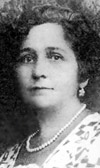Concordia Evgenievna Antarova

Concordia Evgenievna Antarova was born in 1886 April 13 in Warsaw. She lost her father when she was eleven years old, so then she was living with her mother. When she was fourteen years old, being in the sixth grade of a secondary school, she also lost her mother, but she continued her studies and finished the school. Having finished the school, she decided to enter a nunnery. She learned a lot while being in it, and the church choir helped to develop her inborn musical talent. However, she was always feeling that the life of the cloister was not for her. She met Saint John of Kronstadt, and he told her that she was fated to work and live among other people.
She decided to go to St. Petersburg where she entered the faculty of history and philology and graduated it in 1904. She was offered a job in the department of philology, but her dream was singing and theatre. She decided to devote her life to the art. The lessons of singing were expensive, so she had to work hard.
In 1907 from 160 candidates C. E. Antarova alone was accepted to the Mariinsky theatre where her career as an artist began. In one year one of the actresses of the Bolshoi theatre of Moscow had to move to St. Petesburg. C. E. Antarova was offered her place in Moscow. She moved to Moscow and at once the entire complicated repertoire of contralto was offered to her: "Ruslan and Lyudmila", "Eugene Onegin", "Sadko", "Jolanta", "Werther", etc. She knew F. I. Chaliapin, S. V. Rachmaninoff and other famous Russian intellectuals of that time. She was the student of K. S. Stanislavski in his studio of opera which later developed into the Opera theatre of K. Stanislavski. Being fascinated by the personality of K. S. Stanislavski and his artistic ideas, she wrote a book about him "Conversations with K. S. Stanislavski".
C. E. Antarova was performing a lot with symphony orchestras. Her artistic and social activities broke suddenly when she lost her husband in the Stalin's Gulag.
She was dismissed from the theatre and in this way she lost all of her future. However, a life's chance saved her this time, too: Stalin didn't like the voice of the singer who had replaced her, so C. E. Antarova was returned to the Bolshoi theatre...
Concordia Antarova was living two lives of equal value: a creative life of an opera singer and an inner spiritual one... Everyone who knew C. E. Antarova-singer knew almost nothing about her spiritual path, and on the contrary, those who were naming her as their spiritual leader didn't pay lots of their attention to her theatrical creative activities. Her work "Two Lives" is dedicated namely to those disciples of hers who were close to her in spirit. After her death in 1959 her closest disciples were left with four handwritten copies of the novel.
The novel "Two Lives" first of all is an esoteric novel, revealing the esoteric knowledge which is transmitted to the heroes of the novel by the Great Teachers of Mankind. C. E. Antarova herself had her own Teacher and a connection to Shambhala.
Contacting Our Web Site
If you have any questions, please contact us.